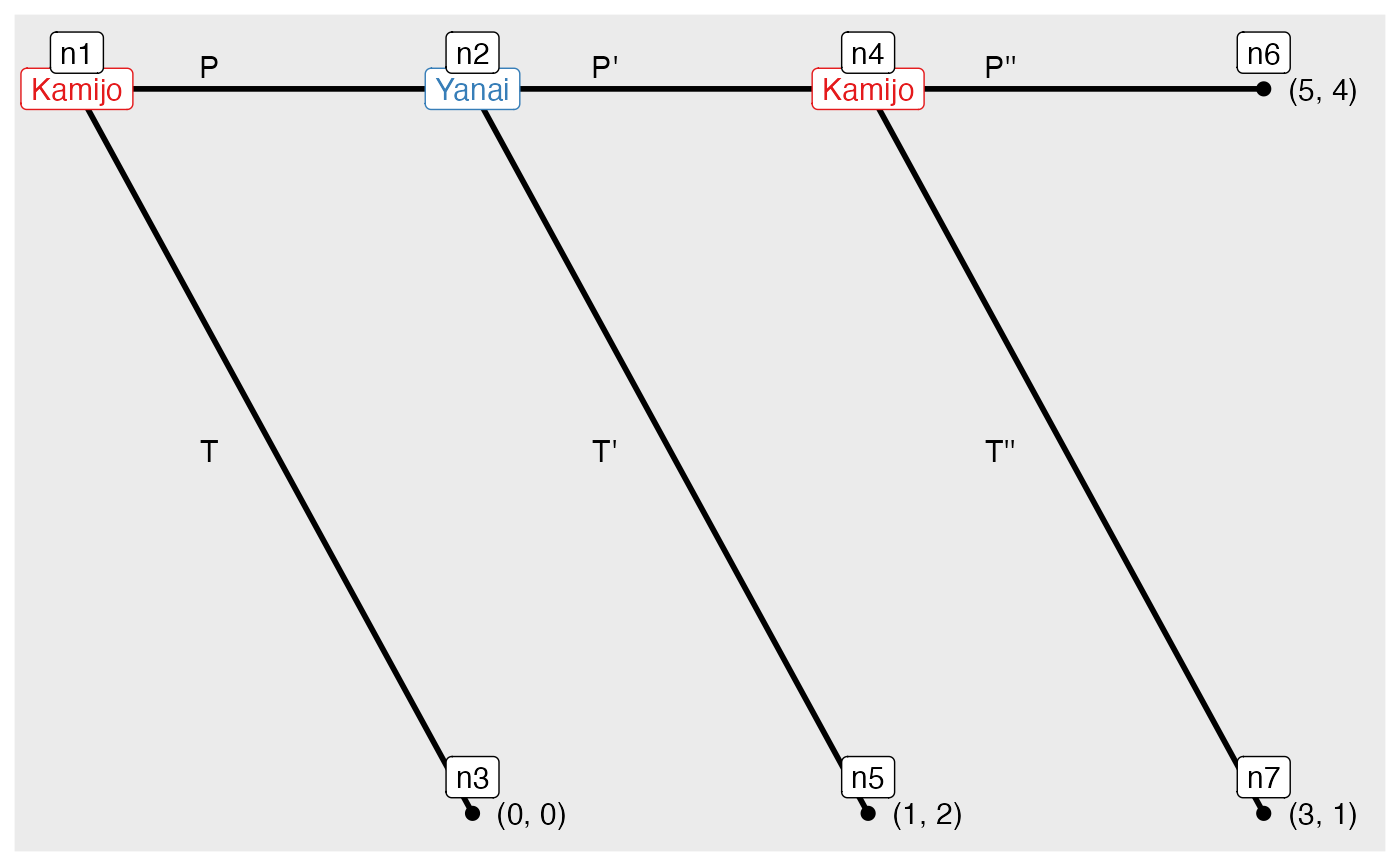extensive_form defines an extensive-form game and draws
a game tree.
extensive_form(
players,
actions,
payoffs = NULL,
payoffs_node = NULL,
show_tree = TRUE,
show_node_id = TRUE,
info_sets = NULL,
info_line = "solid",
direction = "down",
color_palette = "Set1",
family = NULL,
size_player = 4,
size_payoff = 4,
size_action = 4,
size_node_id = 4,
size_terminal = 2,
linewidth = 1,
scale = NULL
)Arguments
- players
A list of players. Each element of the list must be a character string or a vector of character strings at a specific depth of the tree. Terminal nodes, where payoffs are displayed, must be specified as
NA.- actions
A list of actions. Each element of the list must be a vector of character strings that corresponds to a specific player node.
- payoffs
A named list of payoffs. Each element of the list must be a numeric vector of payoffs for a player. The names of the elements must match the names of the players specified by
players.- payoffs_node
A list of payoffs. Each element of the list must be a numeric vector of payoffs for a terminal node.
- show_tree
A logical value. If
TRUE, the game tree will be displayed. Default isTRUE.- show_node_id
A logical value. If
TRUE, the node numbers are displayed in the figure. Default isTRUE.- info_sets
A list of information sets.
- info_line
Line type to connect nodes in an information set. Either
"solid"or"dashed". Default to"solid".- direction
The direction to which a game tree grows. The value must be one of:
"right","up","down","bidirectional"(temporarily disabled),"horizontal", and"vertical". Default is"down".- color_palette
A color palette to be used. Default is "Set1".
- family
A font family to be used in the tree.
- size_player
Font size for the players' names. Default is 4.
- size_payoff
Font size for the payoffs. Default is 4.
- size_action
Font size for the action displayed by each edge. Default is 4.
- size_node_id
Size of the node id. Default is 4.
- size_terminal
Size of the terminal node. Default is 2.
- linewidth
Line width of edges. Default is 1.
- scale
Scale
player_size,payoff_size,action_size,noden_size,terminal_size, andlinewidth. It must be a positive number.
Value
An object of "extensive_form" class, which defines an extensive-form (or sequential) game.
Details
This function defines an extensive-form game and draws the game tree.
Examples
g1 <- extensive_form(
players = list("Kamijo",
rep("Yanai", 2),
rep(NA, 4)),
actions = list(c("U", "D"),
c("U'", "D'"), c("U''", "D''")),
payoffs = list(Kamijo = c(0, 2, 1, 3),
Yanai = c(0, 1, 2, 1)))
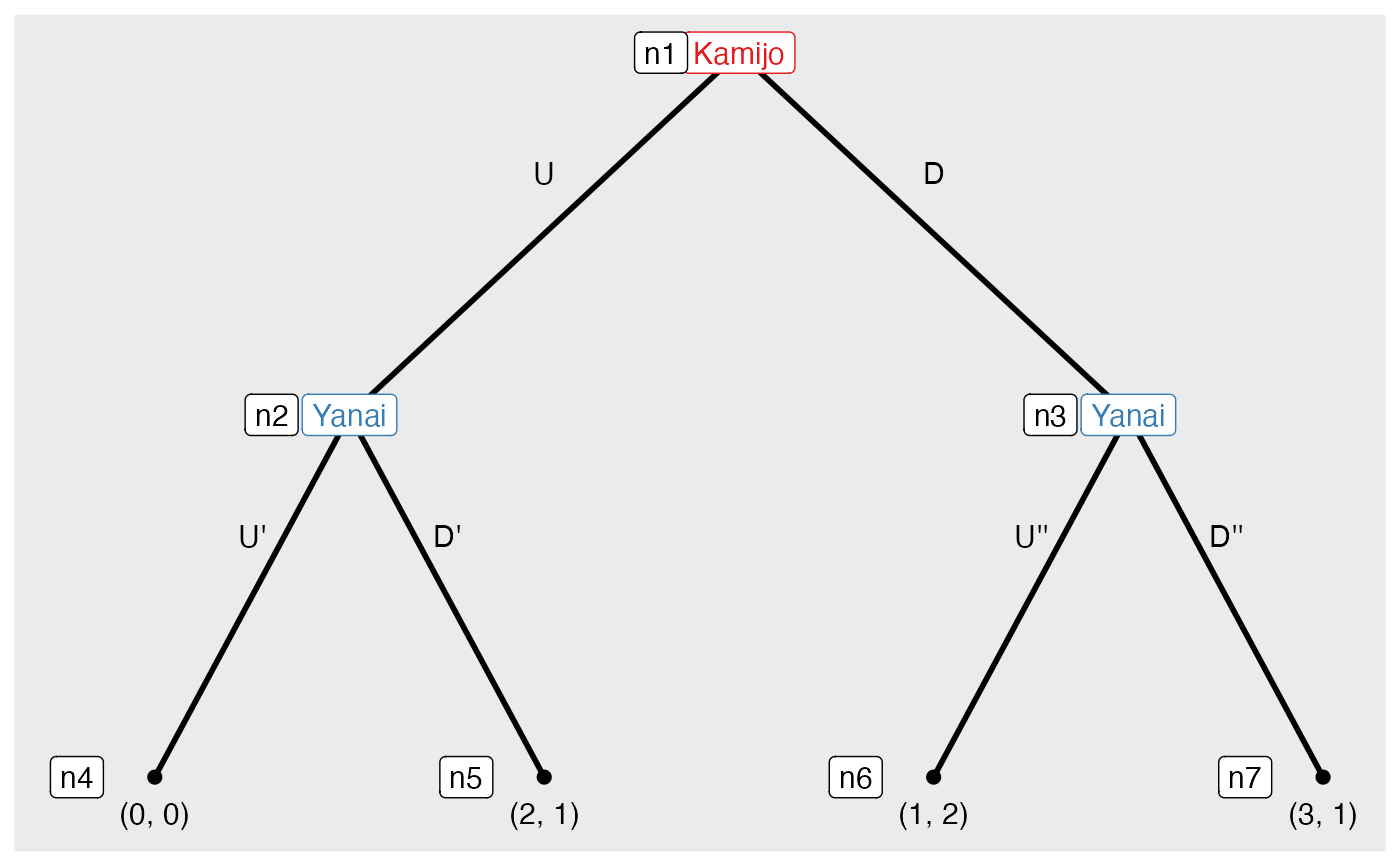 g2 <- extensive_form(
players = list("f",
c("m", "m"),
rep(NA, 4)),
actions = list(c("ballet", "baseball"),
c("ballet", "baseball"), c("ballet", "baseball")),
payoffs = list(f = c(2, 0, 0, 1),
m = c(1, 0, 0, 2)),
show_node_id = FALSE)
g2 <- extensive_form(
players = list("f",
c("m", "m"),
rep(NA, 4)),
actions = list(c("ballet", "baseball"),
c("ballet", "baseball"), c("ballet", "baseball")),
payoffs = list(f = c(2, 0, 0, 1),
m = c(1, 0, 0, 2)),
show_node_id = FALSE)
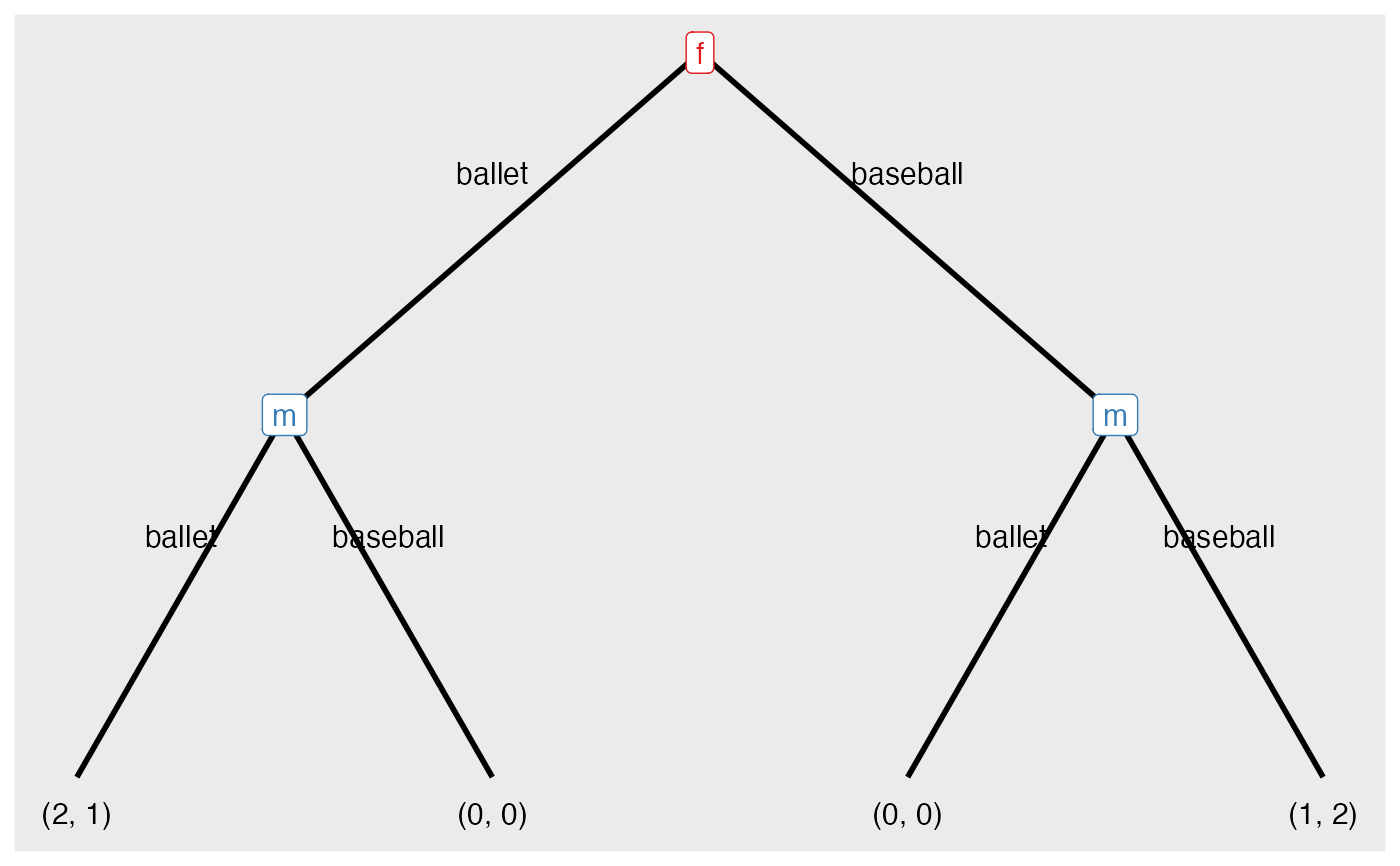 g3 <- extensive_form(
players = list("p1",
rep("p2", 3),
rep(NA, 6)),
actions = list(c("C", "D", "E"),
c("F", "G"), c("H", "I"), c("J", "K")),
payoffs = list(p1 = c(3, 1, 1, 2, 2, 1),
p2 = c(0, 0, 1, 1, 2, 3)),
direction = "down",
show_node_id = TRUE)
g3 <- extensive_form(
players = list("p1",
rep("p2", 3),
rep(NA, 6)),
actions = list(c("C", "D", "E"),
c("F", "G"), c("H", "I"), c("J", "K")),
payoffs = list(p1 = c(3, 1, 1, 2, 2, 1),
p2 = c(0, 0, 1, 1, 2, 3)),
direction = "down",
show_node_id = TRUE)
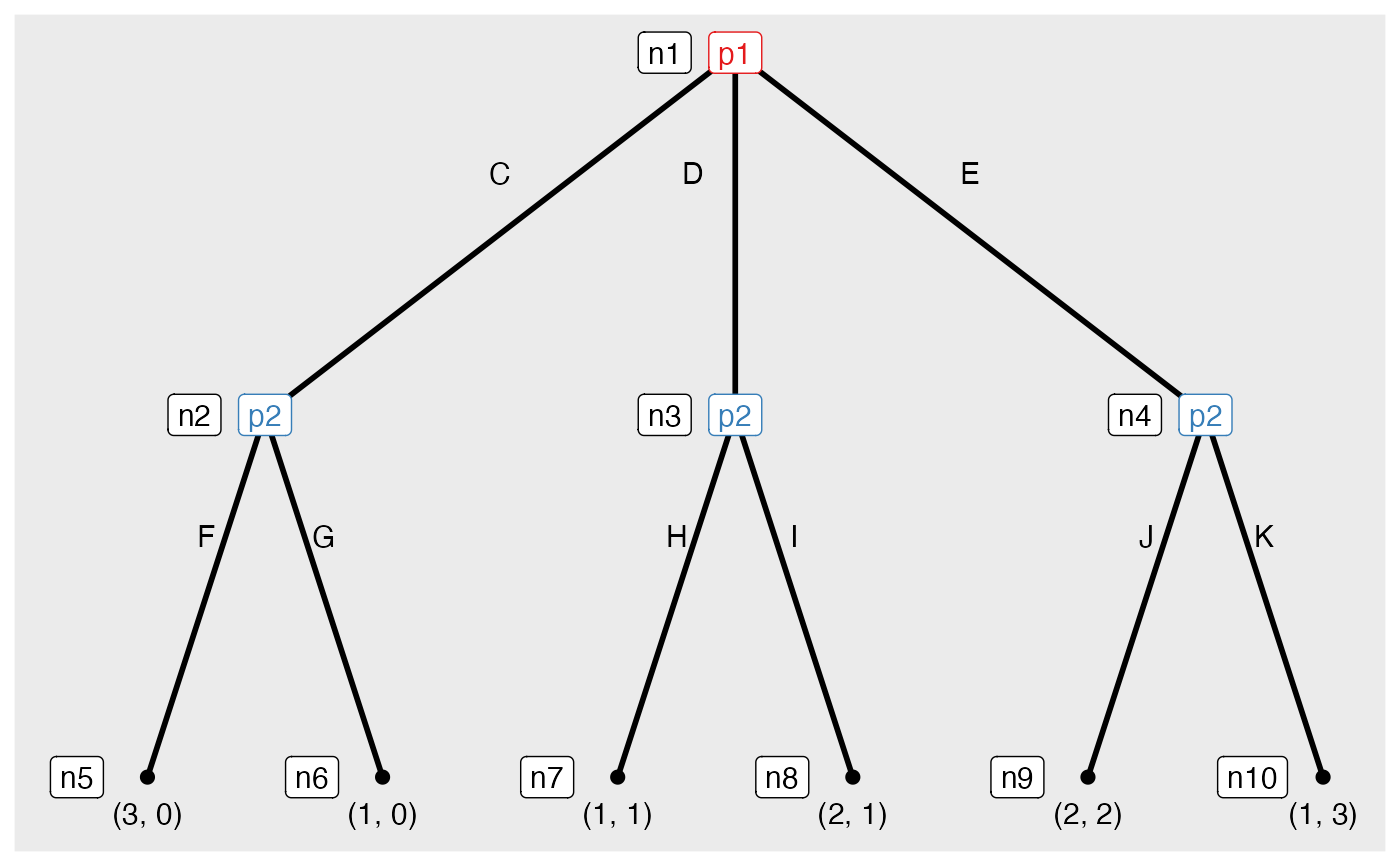 g4 <- extensive_form(
players = list("child",
c(NA, "parent"),
c(NA, NA)),
actions = list(c("give up", "keep asking"),
c("leave", "buy")),
payoffs = list(child = c(0, -10, 10),
parent = c(5, -10, 2)))
g4 <- extensive_form(
players = list("child",
c(NA, "parent"),
c(NA, NA)),
actions = list(c("give up", "keep asking"),
c("leave", "buy")),
payoffs = list(child = c(0, -10, 10),
parent = c(5, -10, 2)))
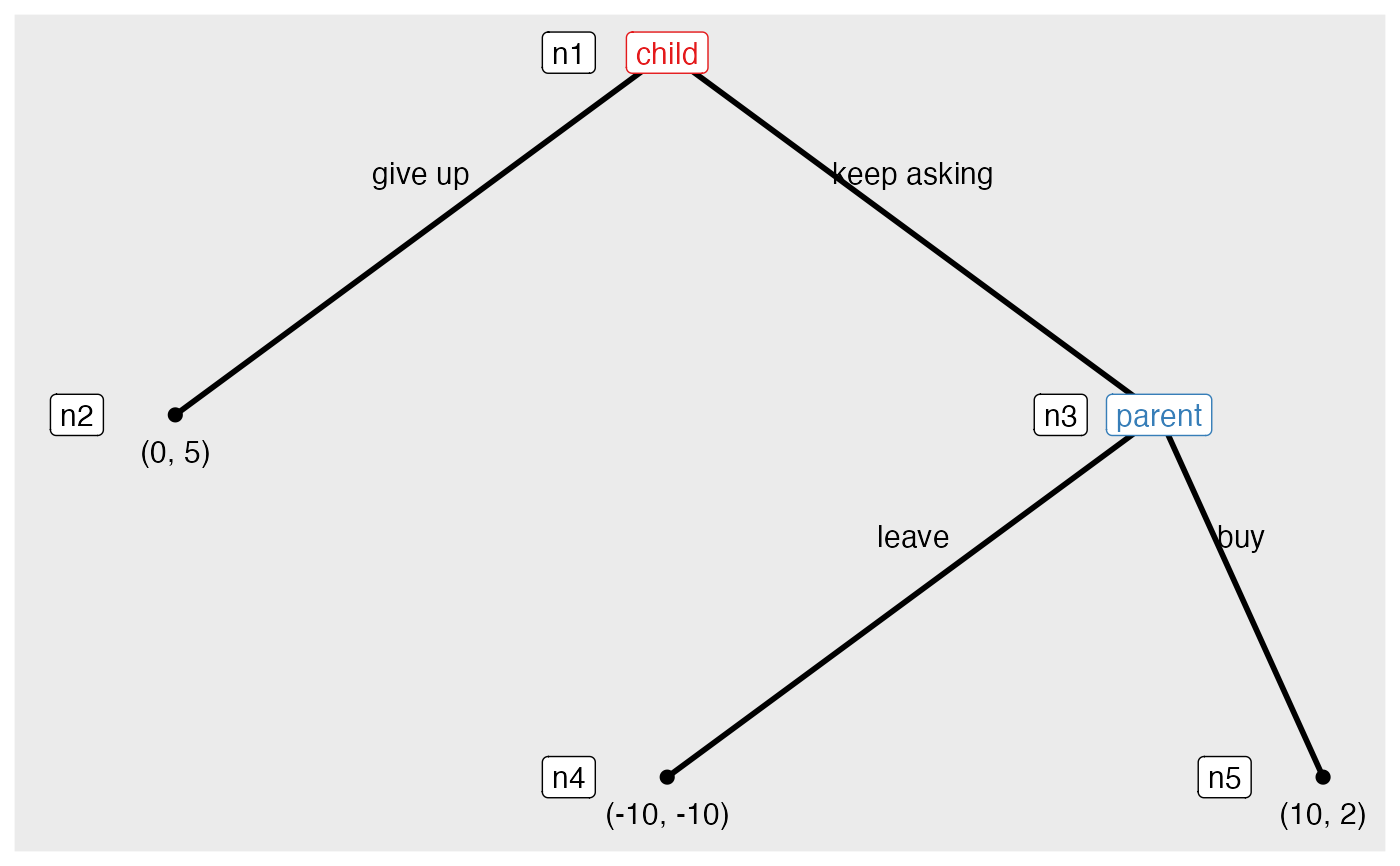 g5 <- extensive_form(
players = list("Kamijo",
c("Yanai", NA),
c("Kamijo", NA),
c(NA, NA)),
actions = list(c("P", "T"),
c("P'", "T'"),
c("P''", "T''")),
payoffs = list(Kamijo = c(0, 1, 5, 3),
Yanai = c(0, 2, 4, 1)),
direction = "horizontal")
g5 <- extensive_form(
players = list("Kamijo",
c("Yanai", NA),
c("Kamijo", NA),
c(NA, NA)),
actions = list(c("P", "T"),
c("P'", "T'"),
c("P''", "T''")),
payoffs = list(Kamijo = c(0, 1, 5, 3),
Yanai = c(0, 2, 4, 1)),
direction = "horizontal")
